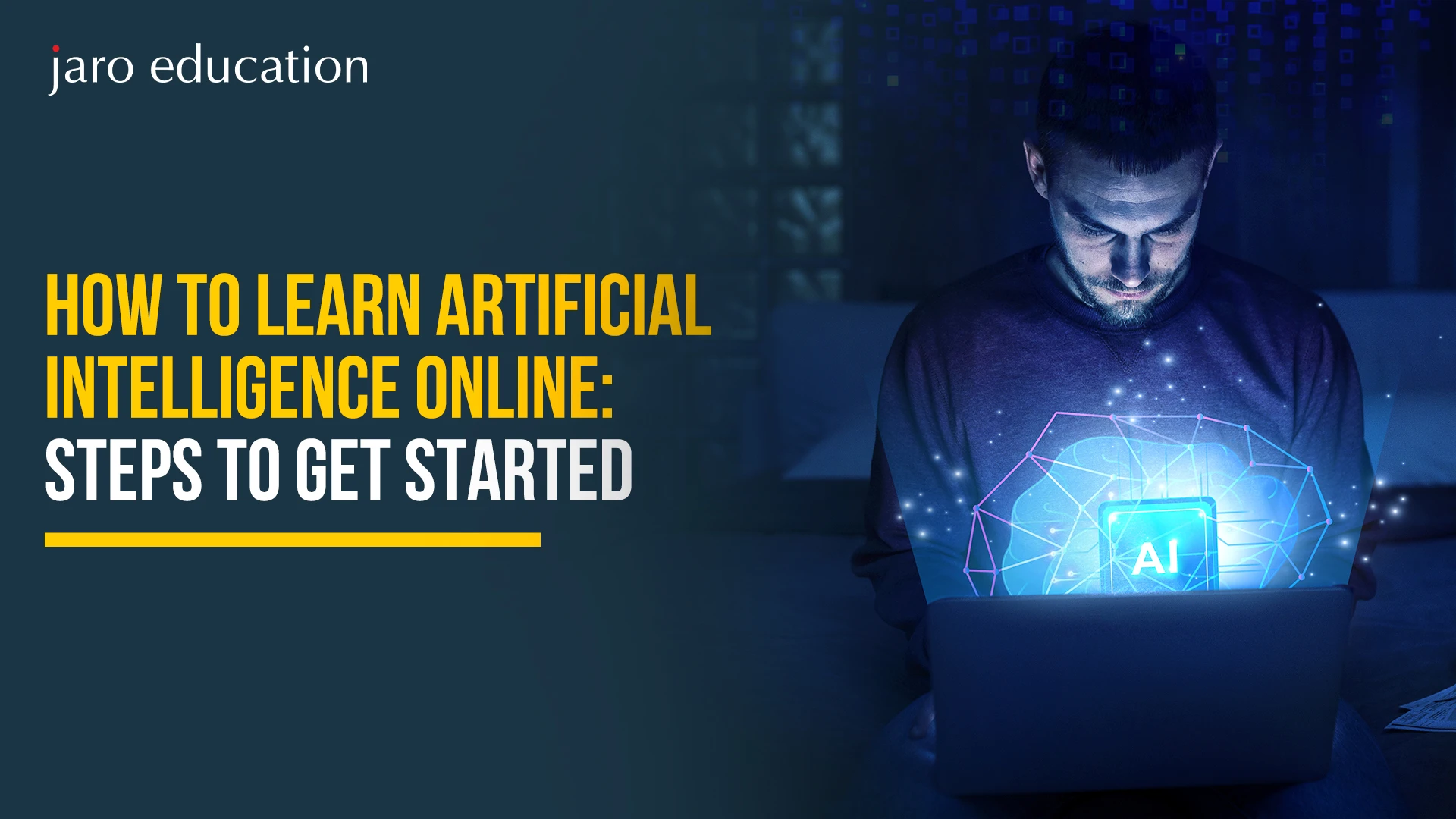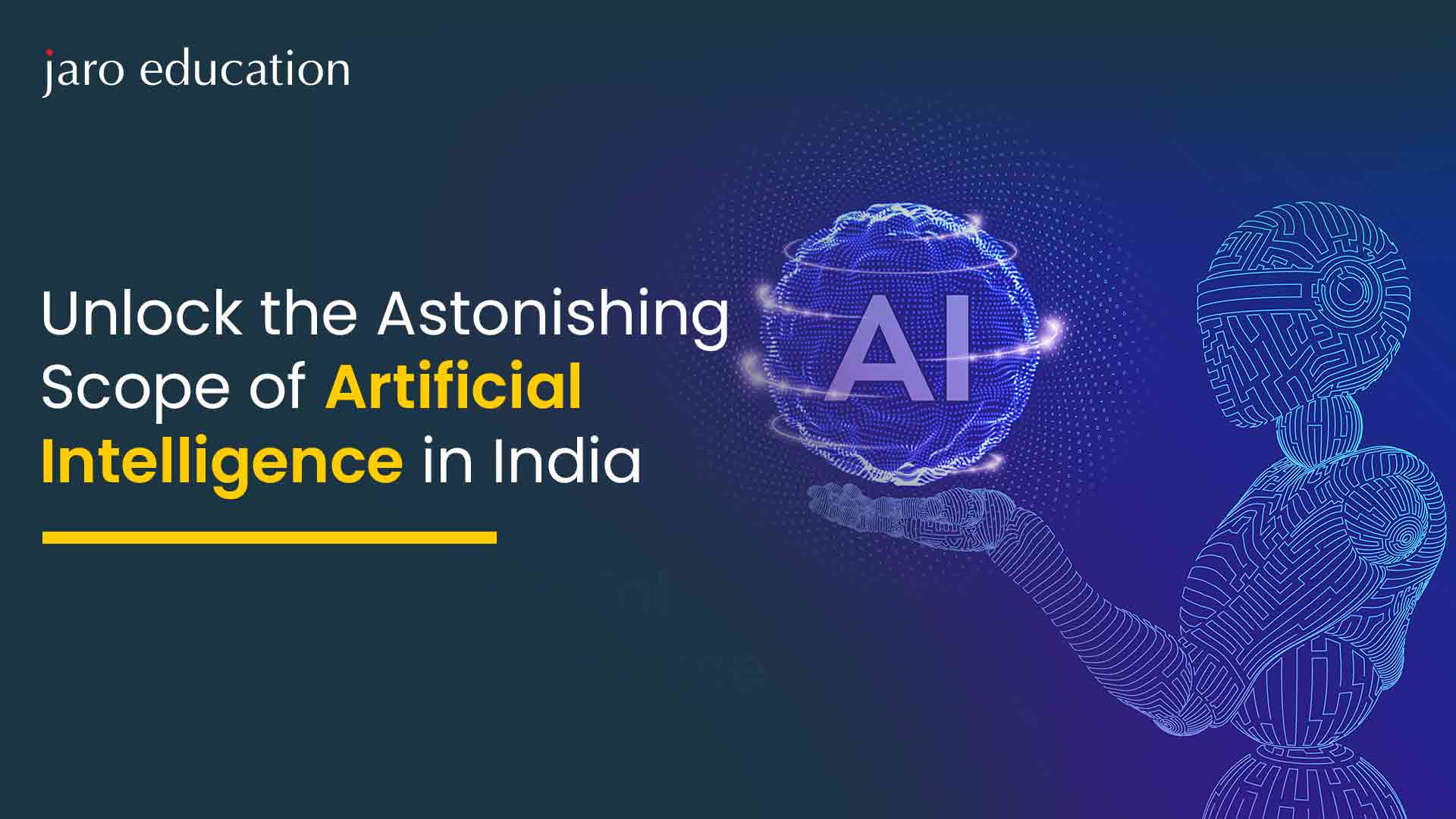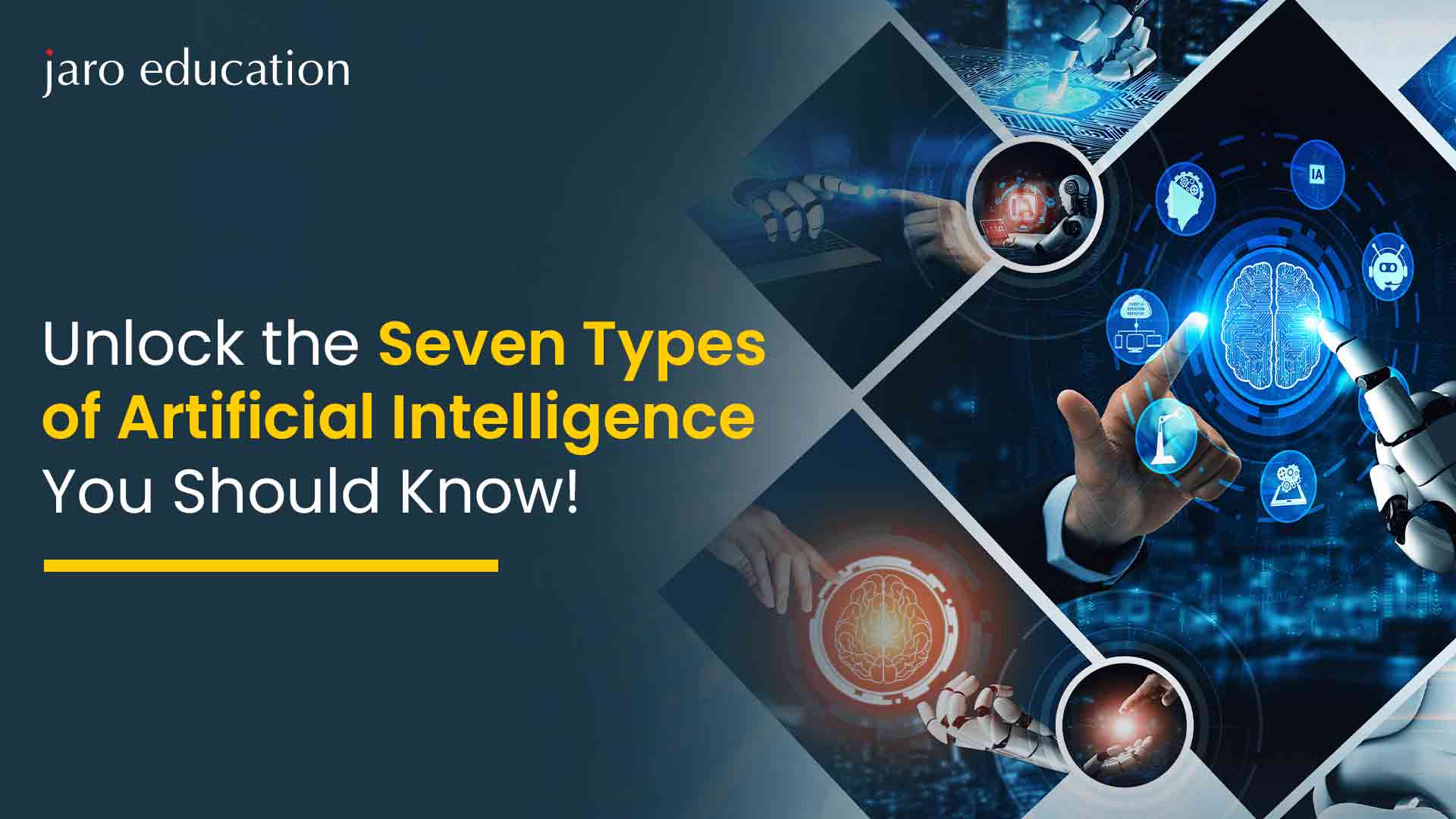18 Cutting-Edge Artificial Intelligence Applications in 2025
Table of Contents
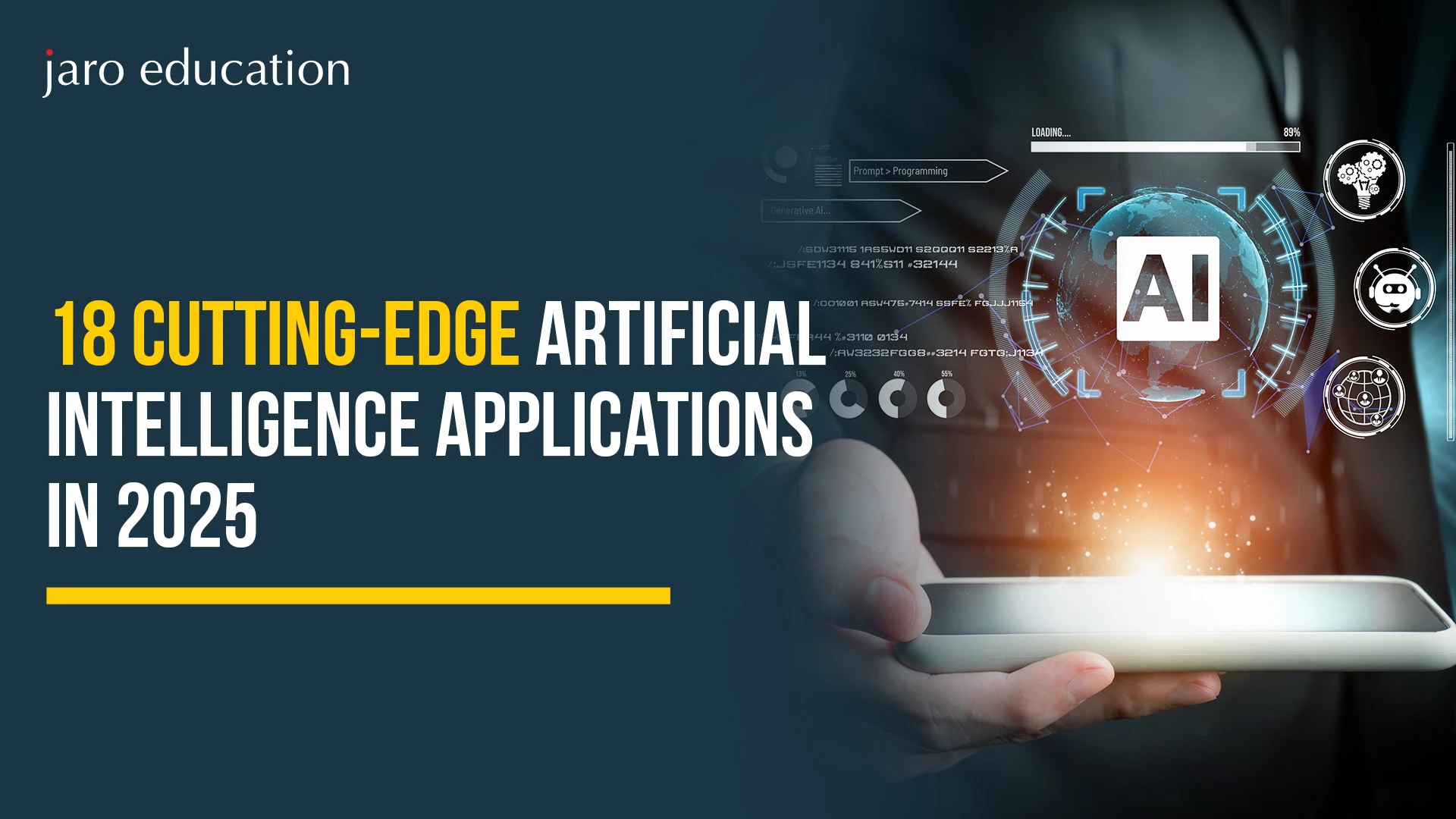
- jaro Education
- 21, March 2024
- 10:00 am
A recent survey of 6000 consumers found that, although only 33 percent of people think they use AI, as many as 77 percent have used or are using AI-powered services or devices. Therefore, it is unsurprising that people are unaware of how much AI touches their lives. The development of AI uses has surged over recent years as researchers have made strides they never expected to make for several more decades.
So, what are the most typical uses and applications for AI? You might be surprised that it could even be such sophisticated robotics AI to use voice search on a smartphone.
Artificial intelligence applications encompass the practical deployment of AI technologies across diverse industries. This application of AI leverages machine learning, deep learning, natural language processing, and other AI applications that use techniques to perform specific tasks, solve complex problems, and enhance decision-making processes. AI applications aim to drive efficiency, automation, and intelligent decision-making, reshaping the operational dynamics of businesses and industries in the modern technological era.
In 2025, AI applications are not just innovative; they’re revolutionizing industries, enhancing daily life, and opening up new frontiers for exploration and efficiency. Here, we delve into 18 cutting-edge artificial intelligence applications that are setting the pace for the future.
AI Applications In Real Life
1. Google DeepMind AlphaFold

*Digit
Challenge: Proteins form specific and complex 3-dimensional structures out of amino acid chains that are not easy to determine. There are about 200 million proteins that exist in the world. It is quite crucial to understand the structures of proteins to understand and decode things like diseases and patterns on a molecular level, but biological structural complexity is not an obstacle.
AI Solution: AlphaFold, trained on all densities of existing protein structures in the pool, analyzes the distance and angle between amino acids to predict the folding patterns; thus, it focuses less on the time factor concerning computation-based biology.
Impact:
- Accelerated drug discovery and molecular studies
- Transforming the field of computational biology for researchers.
2. Amazon: Transforming Supply Chain Management

*Upstox
Challenge: A global supply chain encompasses many complex components, including demand forecasting, inventory control, shipping, and delivery. The main challenge for Amazon has always been knowing how to meet customer demands with reduced prices and, at the same time, manage the inventory.
Solution: Amazon currently employs the application of AI algorithms for predictive inventory management. It works by checking changes in the market, buying trends, and more to predict product demand. The specialty of this application of AI is that it adjusts itself according to real-time market changes.
Impact:
- Economical delivery of operational costs worldwide.
- Improved time-efficient deliveries according to customer satisfaction.
3. Zara: Retail Fashion With AI Zara: Retail Fashion With AI

The fashion industry is rather fast-paced. Fashion trends change within a matter of weeks! At such a pace, it becomes critical to manage inventory, track trends, and everything under the sun. The challenge is to perform timely execution of ever-changing trends and avoid excess stock.
Solutions: Zara now uses the application of AI algorithms to analyze sales data, current fashion trends, sift through customer preferences, and beyond. This enhances understanding of customer preferences, thus aiding in keeping sufficient stocks of fast-selling items, hence reducing attrition of newly introduced items from outlets.
Impact:
- Higher customer satisfaction by aligning the offerings to trends
- Better inventory management that leads to increased sales and profitability
Key takeaways:
- The U.S. application of the AI market is estimated to reach $299.64 billion by 2026.
- The AI market is growing at a rate of 37.3% CAGR from 2022 to 2030.
- By 2025, nearly 97 million people could be employed in the AI domain. AI is now a business priority for 83% of companies. Officer recommendations, automated and personalized, rack up yearly revenues of $1 billion for Netflix. 48% of businesses harness some form of AI to effectively optimize big data. 38% of healthcare providers utilized computers in assisting with diagnosis.
18 Cutting-Edge Artificial Intelligence Applications
1. Social Media Monitoring
The application of AI tools is now capable of analyzing vast amounts of social media data in real time, providing valuable insights into public sentiment, emerging trends, and consumer behavior. This intelligence allows businesses to tailor their strategies more effectively, ensuring they remain aligned with their audience’s needs and preferences, in the following ways:
Understanding Public Sentiment
One of the primary applications of AI in social media monitoring is sentiment analysis. The application of AI algorithms can sift through social media posts, comments, and reactions to determine the overall sentiment toward a brand, product, or service. This analysis helps businesses identify areas of strength and opportunities for improvement, enabling them to answer What is an AI application? to respond proactively to consumer sentiments.
Tracking Trends and Consumer Behavior
By monitoring hashtags, keywords, and topics, AI can be used to identify emerging trends, allowing businesses to stay ahead of the curve. Furthermore, AI-driven analysis of consumer interactions and behaviors on social media platforms offers deep insights into consumer preferences and habits, guiding businesses in developing targeted marketing strategies and product developments.
Enhancing Customer Engagement
By analyzing engagement patterns and preferences, the application of AI tools can help businesses create more engaging content, optimize posting schedules, and interact with their audience in a more personalized manner. This level of engagement fosters a stronger connection between brands and their customers, building loyalty and advocacy.
Virtual Personal Assistants
AI-powered assistants, found in smartphones, smart speakers, and various applications of AI use, are now adept at managing schedules, handling inquiries, providing recommendations, and much more. It offers a seamless blend of convenience and efficiency to users in the following ways:
Managing Schedules with Precision
One of the standout features of the application of AI-powered virtual assistants is their ability to manage schedules meticulously. By understanding natural language inputs and accessing calendar information, these assistants can set reminders, schedule appointments, and even suggest the best times for meetings based on the user’s availability and preferences.
Handling Inquiries and Providing Information:
The application of AI assistants has become more adept at handling inquiries, thanks to advancements in natural language processing (NLP) and machine learning. Whether it’s answering questions about the weather, providing the latest news, or offering factual information, these assistants can fetch and relay information in real time, making them invaluable resources for quick and accurate information to answer What is an AI application?
Personalized Recommendations
AI-powered assistants are now capable of making personalized recommendations. By analyzing user preferences, search history, and even location data, these assistants can suggest restaurants, movies, events, and activities that align with the user’s tastes and interests.
Popular social media platforms’ AI application examples include:
- Facebook (Meta)
- Instagram (Meta)
- YouTube
- TikTok
2. Smart Home Devices
The advent of artificial intelligence (AI) in smart home technology has significantly transformed the way we live, offering unprecedented levels of home security, energy efficiency, and convenience. AI is doing it in the following ways:
Enhancing Home Security with AI
One of the most impactful applications of AI in smart homes is in enhancing security. AI-enabled security cameras and systems can distinguish between regular household activities and potential security threats, such as unknown visitors or unusual movements, alerting homeowners in real time.
AI and Energy Efficiency
Smart thermostats and lighting systems powered by the application of AI contribute significantly to energy efficiency in the home. By learning the occupants’ schedules and preferences, these devices can adjust heating, cooling, and lighting to optimal levels, minimizing energy waste.
Personalized Convenience
The true power of the application of AI in smart home devices lies in their ability to provide personalized experiences. From smart speakers that learn your music preferences to refrigerators that remind you when you’re running low on your favorite groceries.
Learning from User Behaviors
AI systems in smart homes continuously collect data on user interactions and environmental conditions. This data enables the devices to learn and predict user AI behaviors, allowing for a more intuitive and responsive home environment.
Some of the most popular digital assistants and AI applications include:
- Siri (Apple)
- Alexa (Amazon)
- Cortana (Microsoft)
- Google Assistant (Google)
- Bixby (Samsung)
3. Robotic Process Automation (RPA)
Robotic Process Automation (RPA) represents a significant leap forward in workplace efficiency, leveraging Artificial Intelligence (AI) to automate mundane and repetitive tasks, and it successfully does so in the following ways:
AI’s Role in Enhancing RPA
Although RPA operates on rules and structured processes, the incorporation of AI technologies like machine learning, natural language processing, and speech recognition has substantially broadened its functionalities. AI empowers RPA systems to manage unstructured data, make decisions based on previous learning, and adapt to new situations without requiring explicit programming.
Impact on Productivity and Job Satisfaction
RPA’s automation of routine tasks liberates employees to concentrate on higher-value work that demands human intelligence, creativity, and emotional judgment. This transition not only amplifies productivity, allowing businesses to achieve more with fewer resources, but also elevates job satisfaction by alleviating the monotony of repetitive tasks.
Transforming Industries
RPA’s impact is widespread, transforming operations in finance, healthcare, manufacturing, and customer service, among other sectors. In finance, RPA automates tasks like compliance reporting and fraud detection; in healthcare, it streamlines patient appointment scheduling and records management; in manufacturing, it enhances supply chain operations; and in customer service, it powers chatbots and customer inquiry handling.
4. Healthcare Diagnostics
Artificial intelligence (AI) is revolutionizing the healthcare sector, particularly in the diagnostics field. Utilizing advanced algorithms to analyze medical images and patient data, AI-driven tools are significantly improving the precision and speed of disease diagnosis to unprecedented levels in the following way:
Enhancing Diagnostic Accuracy
AI tools excel in identifying diseases from complex patterns in data that might be challenging for the human eye to detect. This capability significantly improves the precision of diagnoses, allowing for the detection of conditions at their earliest stages.
Speeding Up the Diagnostic Process
One of the standout benefits of AI in healthcare diagnostics is its ability to swiftly process and analyze vast amounts of data. This rapid analysis speeds up the diagnostic process, enabling healthcare providers to offer timely interventions and treatment plans.
Alleviating Healthcare Professional Workload
The efficiency and reliability of AI in diagnostics relieve healthcare professionals from the manual and time-consuming aspects of diagnostic processes. This allows them to dedicate more time to patient care and treatment planning, thereby enhancing the overall quality of healthcare services.
5. Personalized Education
The introduction of artificial intelligence (AI) in the educational sector signifies a substantial move towards personalized learning experiences. AI applications stand out in their ability to customize education based on the individual needs, abilities, and learning pace of each student, revolutionizing the conventional one-size-fits-all approach to education in the following way:
Enhancing Engagement and Retention
AI systems can incorporate interactive elements, gamification, and practical examples that align with the student’s interests, significantly improving information retention and making learning more enjoyable.
Providing Real-Time Feedback and Support
One of the key advantages of AI in education is its ability to offer immediate feedback and support. Unlike the traditional classroom setting, where students may wait days for feedback, AI-enabled platforms can provide instant responses to queries and assessments, facilitating a continuous learning process.
Preparing Students for the Future
Personalized education through AI not only caters to academic needs but also prepares students for future challenges. By focusing on individual learning styles and fostering critical thinking and problem-solving skills, AI-equipped education systems equip students with the adaptability and creativity needed in the 21st-century workforce.
6. Autonomous Vehicles
The transportation sector is experiencing a profound evolution with the introduction of autonomous vehicles (AVs), encompassing self-driving cars and drones. This transformative shift is primarily driven by advancements in artificial intelligence (AI), enhancing the safety, reliability, and capability of these vehicles to navigate intricate environments without requiring human intervention in the following ways:
Enhancing Safety and Reliability
AI brings a paramount advantage to autonomous vehicles by notably elevating safety and reliability. Empowered with sophisticated sensors and machine learning algorithms, AI systems can seamlessly process extensive real-time data. This enables them to make instantaneous decisions, identify and respond to potential hazards, and adapt to evolving road conditions with a level of efficiency surpassing that of a human driver.
The Promise of Efficient Transportation
Autonomous vehicles promise to revolutionize the efficiency of transportation. By optimizing routes, reducing traffic congestion, and minimizing human errors that often lead to accidents.
Accessibility and Mobility for All
Autonomous vehicles bring a significant advantage by improving accessibility and mobility for all. Especially beneficial for the elderly, disabled individuals, and those unable to drive, AVs introduce a new level of independence, providing safe and reliable transportation options that were previously unavailable.
7. Predictive Maintenance in Manufacturing
The manufacturing sector is undergoing a notable transformation through the incorporation of artificial intelligence (AI) into predictive maintenance strategies. This pioneering approach utilizes AI to predict equipment failures before they happen, facilitating proactive maintenance scheduling, minimizing downtime, and ultimately leading to cost savings in the following ways:
AI in Predictive Maintenance in Manufacturing
AI systems in manufacturing utilize machine learning algorithms and data analytics to monitor equipment and predict potential breakdowns. By analyzing historical data, operational conditions, and real-time inputs from sensors, AI models can identify patterns and anomalies that precede equipment failures.
Reducing Downtime and Increasing Efficiency
The primary advantage of AI-driven predictive maintenance is its ability to minimize unplanned downtime. By accurately predicting when and where maintenance is needed, manufacturers can schedule interventions at the most opportune times, ensuring that production lines run smoothly and efficiently without unexpected interruptions.
Data-Driven Decision Making
The abundance of data generated and analyzed by AI systems provides valuable insights into the manufacturing process. This data-driven approach facilitates well-informed decision-making, extending beyond maintenance to encompass operational efficiency, quality control, and strategic planning.
8. AI in Agriculture
The agricultural sector is experiencing a profound transformation through the integration of artificial intelligence (AI). AI applications in agriculture are reshaping traditional farming practices, encompassing precision farming to pest control. This revolution aims to enhance crop yields, minimize waste, and foster sustainable food production to meet the growing needs of the world’s population through the following ways:
Precision Farming with AI
AI technologies are at the forefront of precision farming, enabling farmers to make informed decisions that optimize crop health and productivity. Through the analysis of data from satellite images, drones, and ground sensors, AI algorithms can monitor soil health, moisture levels, and crop health in real time.
AI-Driven Pest Control
AI models can identify pest infestations at early stages, even before they become visible to the human eye. This early detection enables targeted interventions, preventing widespread damage to crops and reducing the reliance on chemical pesticides.
Enhancing Crop Yields and Reducing Waste
AI’s proficiency in analyzing extensive data sets and predicting outcomes is pivotal for elevating crop yields and reducing waste. Predictive analytics enables the forecasting of weather patterns, crop diseases, and pest infestations, empowering farmers to proactively implement preventive measures.
Sustainable Food Production
Through efficient resource utilization and waste reduction, AI-driven farming practices guarantee that food production can match the pace of population growth without depleting natural resources or causing harm to the environment.
9. Financial Fraud Detection
In the digital age, financial fraud has become increasingly sophisticated, posing a significant challenge to the security of financial operations worldwide. Artificial intelligence (AI) has emerged as a powerful tool in combating this challenge, with algorithms that excel at detecting fraudulent transactions in real time. AI can combat these challenges in the following ways:
AI Helps in Fraud Detection
AI algorithms are designed to analyze vast volumes of transaction data at speeds and accuracies unattainable by human analysts. They scrutinize patterns, detect anomalies, and identify potentially fraudulent activities by learning from historical fraud data and continuously adapting to new fraudulent tactics. This real-time analysis enables immediate action, such as blocking suspicious transactions before they are completed, thereby significantly reducing potential financial losses.
The Role of Machine Learning in Fraud Detection
The machine learning models are trained on datasets of both fraudulent and legitimate transactions, enabling them to distinguish between normal and suspicious behaviors effectively. This ongoing learning process ensures that AI systems remain up-to-date with the latest fraud tactics, making them invaluable assets in financial security.
Enhancing Customer Trust
By safeguarding assets and personal information against fraud, AI-driven systems significantly enhance customer trust in financial institutions. This trust is crucial in the competitive financial services industry, where security is a top concern for customers. Institutions that leverage AI for fraud detection can assure their customers of their commitment to security, thereby fostering loyalty and confidence.
10. Natural Language Processing (NLP)
Natural Language Processing (NLP) takes center stage, profoundly bridging the communication gap between humans and machines. This facet of artificial intelligence (AI) is dedicated to empowering computers to comprehend, interpret, and generate human language in a manner that is both meaningful and practical. NLP is empowering computers in the following ways:
The Advancements in NLP
Recent years have witnessed remarkable progress in NLP, driven by sophisticated machine learning algorithms and vast amounts of data. These advancements have led to the development of more intuitive user interfaces, such as voice-activated assistants, real-time translation services, and chatbots that can engage in increasingly complex conversations. The goal is to make interactions with machines as natural and effortless as speaking to another human.
Enhancing Machine Understanding
One of the key achievements of NLP is the enhancement of machine understanding of human language. Through techniques like sentiment analysis, entity recognition, and syntactic parsing, NLP systems can grasp the nuances of language, including context, tone, and intent.
Applications of NLP
In customer service, chatbots equipped with NLP can handle inquiries and resolve issues around the clock. In the realm of content creation, NLP tools assist in summarizing articles, generating reports, and even creating written content.
11. AI in Entertainment
Artificial intelligence (AI) is dramatically transforming the entertainment industry, ushering in an era of personalized content and pioneering new forms of artistic expression. AI is enabling creators and platforms to deliver content that resonates more deeply with individual preferences, while also pushing the boundaries of creativity in music, art, and beyond, and it does it successfully in the following ways:
Personalized Content Recommendations
One of the most visible impacts of AI in entertainment is in content recommendation systems. Streaming platforms like Netflix and Spotify use AI to analyze viewing and listening habits, respectively, tailoring suggestions to each user’s unique tastes.
AI-Generated Music and Art
AI is not just curating content but also creating it. AI-generated music and art are emerging fields where algorithms are used to compose sounds or create artwork. These AI creations can range from entirely original pieces to works inspired by the styles of existing artists or genres.
Enhancing Movie Production
In movie production, AI plays a crucial role in everything from scriptwriting to post-production. AI algorithms can analyze scripts to predict box office success, assist in editing by selecting the best shots from vast amounts of footage, and even generate realistic visual effects.
12. Supply Chain Optimization
Supply chain management integration with artificial intelligence (AI) is reshaping how businesses forecast demand, handle inventory, and facilitate deliveries. AI empowers companies to attain unparalleled levels of efficiency and speed in their supply chains, ensuring products are delivered with unprecedented speed and reliability. AI empowers supply chain management in the following ways:
Predictive Analytics for Demand Forecasting
AI algorithms delve into extensive datasets, encompassing historical sales data, market trends, and even social media sentiment. This sophisticated analysis allows for highly accurate predictions of future demand.
Streamlining Inventory Management
By predicting demand fluctuations and identifying patterns, AI systems can suggest optimal stock levels, reorder points, and even automate the ordering process. This not only saves time but also significantly reduces human error, ensuring that inventory is always aligned with demand.
Optimizing Logistics and Delivery
Utilizing advanced AI algorithms, considerations of traffic conditions, weather forecasts, and delivery windows are factored in to determine the most efficient routes. This optimization results in quicker delivery times, decreased fuel consumption, and reduced operational costs, providing benefits to both businesses and consumers.
Overcoming Supply Chain Disruptions
By monitoring global events, weather patterns, and other external factors, AI can alert businesses to risks that may impact their supply chain, allowing them to take preemptive action to mitigate these risks.
13. Environmental Protection
AI applications are now pivotal in monitoring environmental data, predicting the impacts of climate change, aiding conservation efforts, and optimizing resource use. This technological intervention is proving to be a crucial ally in protecting our planet. AI is helping with environmental issues in the following ways:
Monitoring and Predicting Climate Change
AI systems exhibit the capability to process and analyze extensive environmental data sourced from satellites, sensors, and historical records. Through this thorough data analysis, AI aids in precisely modeling climate patterns, predicting future climate change impacts, and identifying ecosystems susceptible to such changes.
Optimizing Resource Use
AI applications in smart agriculture use predictive analytics to optimize water usage and crop yields, reducing waste and minimizing environmental impact. Similarly, AI-driven energy systems can forecast demand and adjust renewable energy production accordingly, enhancing the efficiency of green energy sources.
Reducing Pollution and Waste
AI also plays a significant role in reducing pollution and managing waste. Smart city applications monitor air quality in real time, enabling swift actions to reduce pollution levels. In waste management, AI-powered sorting systems improve recycling processes, ensuring materials are reused and diverted from landfills.
14. AI in Retail
Retailers are harnessing the power of AI to revolutionize inventory management, craft personalized shopping experiences, and optimize supply chains. Beyond enhancing operational efficiency, this technological advancement is propelling customer satisfaction to unprecedented heights in the following ways:
Revolutionizing Inventory Management
AI is reshaping retail inventory management by forecasting stock levels, automating restocking processes, and discerning patterns in sales data to prevent both overstocking and understocking. Through an analysis of historical sales data, AI algorithms accurately predict product demand, ensuring retailers maintain optimal stock levels consistently.
Personalizing the Shopping Experience
A prominent influence of AI in retail is the personalized touch it brings to the shopping experience. AI-powered systems scrutinize customer data, encompassing past purchases, browsing history, and preferences, to provide customized recommendations. This heightened level of personalization not only enriches the shopping experience, making it more captivating and efficient for customers, but also amplifies loyalty and boosts sales for retailers.
Optimizing the Supply Chain
AI is also streamlining supply chain operations in the retail industry. From predictive analytics for demand forecasting to automated warehousing and intelligent logistics, AI is making supply chains more efficient and responsive. By optimizing delivery routes and schedules, AI reduces shipping times and costs, enabling retailers to offer faster, more reliable delivery options to their customers.
15. Cybersecurity
AI-driven systems are revolutionizing the field by predicting, identifying, and neutralizing potential threats before they escalate into breaches. It offers a new level of protection for data and digital assets in the following ways:
Predictive Threat Detection
One of the key strengths of AI in cybersecurity is its predictive capability. By analyzing patterns and anomalies in vast amounts of data, AI algorithms can identify potential threats and suspicious activities with remarkable accuracy.
Enhancing Threat Identification
AI enhances the identification of threats by continuously learning from new data. Unlike traditional security systems that rely on known threat signatures, AI-driven systems can adapt to new and evolving threats in real time. This adaptability is crucial in combating zero-day exploits and sophisticated cyberattacks that conventional methods may overlook.
Strengthening Data Protection
AI enhances the identification of threats by continuously learning from new data. Unlike traditional security systems that rely on known threat signatures, AI-driven systems can adapt to new and evolving threats in real time. This adaptability is crucial in combating zero-day exploits and sophisticated cyberattacks that conventional methods may overlook.
16. Drug Discovery and Development
AI applications are revolutionizing this field by significantly speeding up the process of identifying potential treatments and analyzing vast datasets more efficiently than traditional methods. This advancement holds the promise of delivering quicker responses to global health crises, marking a new era in medical innovation, in the following ways:
The Role of AI in Streamlining Drug Discovery
AI algorithms excel in sifting through extensive biological and chemical data to uncover hidden patterns and insights that might indicate potential therapeutic effects. This capability enables researchers to rapidly identify candidate molecules with a high likelihood of success in treating specific diseases.
Enhancing Predictive Analysis
One of AI’s most significant contributions to drug discovery is its predictive analytics capability. AI models can predict how different chemical compounds will react with biological targets, providing valuable insights into their efficacy and safety profiles.
Facilitating Personalized Medicine
AI’s ability to analyze complex genetic and environmental data is paving the way for personalized medicine. By understanding the genetic makeup of individuals and how it affects their response to certain medications, AI can help in designing personalized treatment plans.
Overcoming Challenges in Drug Development
Drug development is fraught with challenges, including high failure rates, lengthy timelines, and substantial financial investments. AI is addressing these challenges by improving the accuracy of preclinical tests, optimizing clinical trial designs, and predicting potential side effects early in the development process.
17. Content Creation
As we all already know, AI applications in content creation have reached a point where they can generate written content, videos, and music, providing creators with powerful tools to enhance efficiency and unleash creativity. This evolution marks a significant milestone in the way content is produced, offering new possibilities and reshaping traditional creative processes in the following ways:
AI-Generated Written Content
AI can generate articles, reports, and marketing copy that align with specific styles and guidelines. This capability not only speeds up the content creation process but also helps maintain a consistent voice and quality.
Transforming Video Production
AI algorithms can assist in editing by selecting the best shots, generating realistic CGI effects, and even creating trailers that capture the essence of the content. This automation allows filmmakers and video creators to focus on the creative aspects of production, pushing the boundaries of storytelling and visual expression.
Innovating Music Creation
AI is also making waves in the music industry, offering tools that can compose music, generate background scores, and even simulate the voices of popular artists.
Enhancing Creativity and Efficiency
AI frees up creators to focus on innovation and storytelling. Additionally, AI can suggest variations and improvements, acting as a creative partner that brings new perspectives and ideas to the table.
Now, the question arises of where you can kickstart your career in the AI world.
Kickstart AI Career With IIT Roorkee
Applied data science and artificial intelligence (AI) are used to analyze various types of real-life datasets to produce actionable insights for applications in business, economy, and society. Over the last few years, these skills have gained immense charm for all organizations. The Post Graduate Certificate Programme in Applied Data Science & AI aims to upskill working professionals to understand some of the basic concepts of data science and AI, acquire hands-on skills in allied software technologies, and enhance their ability to specify the best course of action in various application contexts.
Below is the list of key highlights:
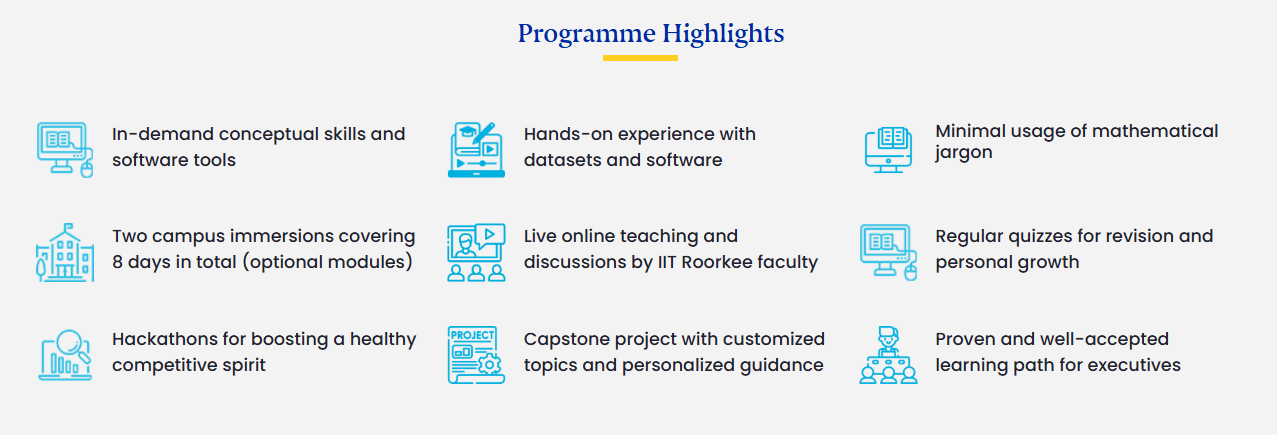
Get A Career Counselling
Jaro Education is one of the top EdTech companies in India, collaborating with several of the best universities across the globe on executive, online, and distance learning programs. With over 10 years of experience, Jaro has been instrumental in building the careers of thousands of students and working professionals through higher education.
- Personalized Guidance
Career advisors assess your educational background, work experience, and aspirations.
Program customization for your goals (e.g., MBA in Finance, Data Science, etc.),
- Skill and Industry Fit
Foresight into current job market trends to pick programs that give high ROI.
Future-ready skills are in focus: AI, Data Analytics, Digital Marketing, Finance, HR, etc.
- End-to-End Support
- Assistance for admissions
- application assistance
- Profile development
- mock interviews and counseling calls
- Career Development Webinars
- Learning Flexibility
Jaro recommends programs that align with your lifestyle, for example:
- Executive MBAs for working professionals
- Online degrees with global certification
- Short-term upskilling
Conclusion
Navigating the vast domain of artificial intelligence applications reveals that AI transcends mere technological advancement; it is a transformative force reshaping our world. From revolutionizing healthcare diagnostics and streamlining drug discovery to enhancing content creation and personalizing retail experiences, the profound impact of AI is far-reaching.
The future of AI holds incredible promise but necessitates a balanced approach that acknowledges both its potential benefits and challenges. Looking forward, the continuous evolution of AI promises even more innovative applications and solutions. As AI becomes more integrated into our daily lives and industries, its potential to transform our world knows no bounds. The journey of AI is an ongoing exploration of how technology can enhance human capabilities, improve global conditions, and open new frontiers of possibility.
Frequently Asked Questions
AI (artificial intelligence) applications involve using computer systems to perform tasks that normally require human intelligence. This includes learning, reasoning, problem-solving, language understanding, and decision-making.
AI is used in:
- Healthcare (diagnostics, robot-assisted surgery)
- Finance (fraud detection, algorithmic trading)
- Retail (personalized recommendations, chatbots)
- Manufacturing (predictive maintenance, automation)
- Transportation (self-driving cars, traffic prediction)
- Education (adaptive learning systems)
- Customer Service (virtual assistants, AI chatbots)
- Machine Learning (ML)
- Natural Language Processing (NLP)
- Computer Vision
- Speech Recognition
- Robotic Process Automation (RPA)
- Expert Systems
Businesses use AI to:
- Automate repetitive tasks
- Enhance customer experience
- Improve data-driven decision-making
- Optimize logistics and supply chains
- Predict market trends and consumer behavior
- Increases efficiency and productivity
- Reduces human error
- Enables 24/7 availability (e.g., chatbots)
- Unlocks insights from large datasets
- Enhances personalization in services





